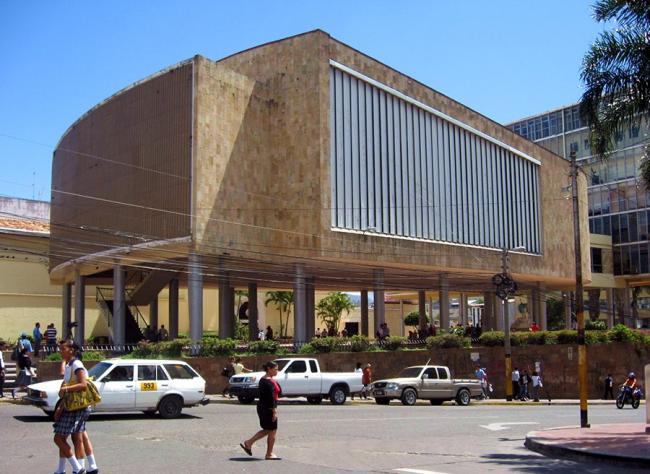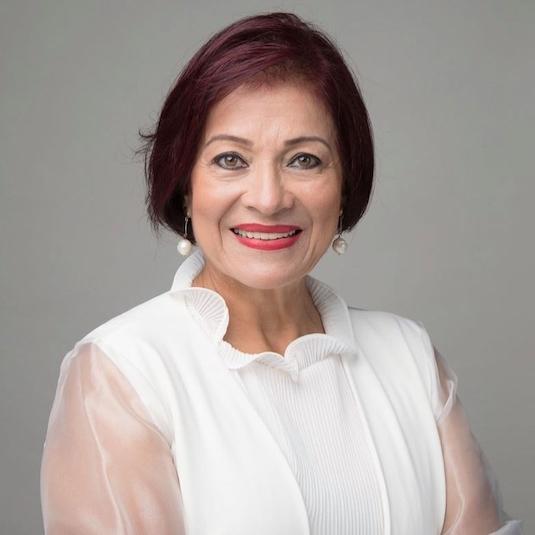
Leer este artículo en español.
On July 25, 2021, five assassins disguised as a Covid-19 medical team arrived at the Tegucigalpa home of Carolina Echeverría Haylock, a lawyer, former congresswoman, and congressional candidate for the Liberal Party of Honduras from the predominantly Indigenous Miskitu department of Gracias a Dios. Since her husband was home recovering from Covid-19, Echeverría opened the door. Once inside, the hitmen shot her 14 times.
Perhaps more chilling than the details surrounding Echeverría’s murder is the fact that it is far from an isolated incident. Her case is reflective of an alarming trend throughout Central America: public figures are frequently murdered. Those who dare to challenge the status quo and stand up to private interestsin particular human rights defenders, environmental activists, and members of left-wing political partiesare among the most commonly targeted. This violence, combined with high levels of impunity, has created a disastrous and dangerous atmosphere for high profile women who are fighting for equality and representation within Honduran society.
Honduras currently holds the highest rate of femicide in Latin America, 6.2 per 100,000 women, with 278 femicides reported in 2020. Carolina spoke out about violence against women in Honduras a year before she herself became a victim. Targeted attacks against female leaders like Carolina are exceptionally problematic: beyond the general deplorable loss of life, these assassinations have broader ripple effects in society and make women’s ability to gain equality in representation difficult.
Currently, Honduran women hold 27.3 percent of legislative seats in the country and only a third of supreme court justices are women. Disparities are not just evident at the highest levels: 30.7 percent of city council members and 7.4 percent of mayors elected in 2021 were women, meaning a mere 17 of 298 mayoral posts are held by women. Although Hondurans recently elected their first female president, Xiomara Castro, she has received criticism for failing to fulfill campaign promises to advance women’s rights in the country, including for appointing a mostly male cabinet.
The Violence Against Public Figures Project
Given these alarming trends, the Violence Against Public Figures (VAPF) project is working to compile the first comprehensive, cross-national dataset of these incidents across Central America. The VAPF Project tracks cases of lethal violence occurring between 2008 and 2022 for male and female public figures, a term that includes politicians, activists, judges, lawyers/prosecutors, and journalists. The preliminary data from Honduras paints a very concerning picture: approximately 590 public figures have been killed in Honduras alone in the last 15 years. For comparison, 13 public figures were killed in Costa Rica during the same period. While data collection is ongoing, preliminary results suggest Honduras has by far the highest rate in the region.
By category, this translates to 92 politicians, 88 media workers, 149 judicial workers, and 285 activists (individuals with more than one relevant profession are counted twice here; Echeverría is coded as both a politician and a lawyer). The most acute period of violence in Honduras occurred following the 2009 coup d’état, with targeted attacks against public figures peaking in 2011 when 78 individuals12 of whom were womenwere murdered. While violence has decreased since then, the issue is far from abating; in just the last four years, 110 public figures were killed in Honduras, 18 of them women, according to VAPF data. Within the first week of 2023, two activists from Guapinol were assassinated.
The work of gathering and publishing information on public figures killed in Central American countries like Honduras is hindered by the threats faced by journalists themselves. In addition to the daily dangers that investigative journalists face in Honduras, political turmoil often leads to higher risks and targeted killings of media workers. In the years following the 2009 coup, various journalists that opposed the ouster of President Mel Zelaya faced frequent threats of violence, with six media workers killed in under two months. Luz Marian Paz Villalobos was another such journalist. Villalobos worked as a news director for Cadena Hondureña de Noticias (CHN), a popular radio news station, and in 2011 this criticism cost her life when she was assassinated by armed men on motorcycles. No arrests were ever made for her murder.
A Culture of Impunity
Far from an anomaly, the lack of arrests for Villalobos’s murder is reflective of weak judicial frameworks and widespread impunity in Honduras, where perpetrators often walk away from their crimes without punishment. This is exacerbated by the fact that judges, lawyers, and prosecutors are frequently targeted for assassination, with 19 percent of murdered judicial workers being women. Honduras ranks towards the bottom on global measures of rule of law, and reports suggest a mere 24 percent of homicides are investigated in the country, of which only 13 percent reach any kind of judicial resolution. Moreover, even when arrests do occur, the wrong parties are sometimes identified as responsible for the crimes committed.
For instance, in 2014 two women prosecutors, Marlene Banegas and Patricia Eufragio, were assassinated by sicarios (hitmen) in the Honduran city of San Pedro Sula while on their way home from work. Banegas was shot over 50 times. The chief of police stated that members of the Barrio 18 gang were responsible for the murders. But three years later, in 2017, two former police affiliated with Barrio 18’s rival, Mara Salvatrucha (MS-13), were sentenced to 13 years for their connection to Banegas’s killing. At the time of her assassination, Banegas was reviewing the details of a large corruption case, and, according to subsequent testimony from the Geovanny Fuentes Ramírez trial, she was one of two individuals given a copy of a video linking then President Juan Orlando Hernández to the now convicted narco-trafficker.
In Echeverría’s case, only three of the five hitmen hired for her assassination have been arrested. These hitmen, also allegedly members of the Maras gang, are not believed to have been the sole perpetrators; the intellectual author and party that paid (allegedly a million lempiras) to have Echeverría murdered has yet to be held accountable. Relatives have stated her murder was politically motivated, and Carolina had reportedly turned down a $400,000 bribe to abandon her candidacy. Other theories behind the former congresswoman’s murder relate to her work as a lawyer and the extensive reach of narco-politics in Echeverría’s native Gracias a Dios department. Nonetheless, these examples highlight the risks faced by those working in the legal system, leading to reluctance to investigate or convict perpetrators of corruption and violence, thus further eroding the rule of law.

A Lack of Justice for Human Rights and Land Defenders
Justice for murdered Honduran activists may prove especially elusive, with impunity rates reportedly as high as 90 percent for crimes against human rights activists and 96 percent for the killing of land defenders. One notable exception is the case of Berta Cáceres, an internationally acclaimed and award-winning environmental defender and Indigenous Lenca activist. Cáceres was violently murdered in her home in 2016 in retaliation for her activism. Her story is remarkable, both for her renowned advocacy and because it is a rare case in which a top executive was formally charged and convicted for her death. This conviction can likely be attributed to international and national pressure to bring justice to her case.
Three of Cáceres’s colleagues had been killed prior to her death, and many other Indigenous and land-rights activists have been targeted without receiving equal attention. Tolupán Indigenous human rights activist Maria Enriqueta Matute was one such defender who was attending a peaceful protest in 2013 when she was chased down by armed men and assassinated along with two male colleagues. No one was convicted for their murders. In 2020, Laura Carolina Valentín Dolomo, a Garifuna activist and member of the Honduran Black Fraternal Organization (OFRANEH), was found dead in La Ceiba. Despite calls for an investigation, no autopsy was conducted and no one has been arrested.
LGBTQI+ activists in Honduras have also faced extreme persecution. Gloria Carolina Hernández Vásquez, a well-known LGBTQI+ rights and HIV/AIDS advocate, was kidnapped and murdered in 2015. Last year two prominent trans activists, Melissa Núñez and Thalía Rodríguez, were also assassinated. Cases like these highlight the dangers that women-identifying activists face for their work in Honduras, where a culture of impunity threatens their ability to create positive change for themselves and their communities.
La Lucha Sigue (The Fight Continues)
Despite these attacks, the women of Honduras continue to fight for their rights, with some even using the fear intended to silence them as common ground for others to rally behind. After her mother’s murder, the daughter of Berta Cáceres followed her legacy and carried on her activism, arguing that her mother hadn’t died, she multiplied. Erika Urtecho Echeverría, Echeverría’s daughter, is another example of this incredible resilience. After her mother’s death, Urtecho ran in her place and is now the congresswoman for the department of Gracias a Dios.
On the one year anniversary of her mother’s assassination, Congresswoman Urtecho tweeted that those who took her mother may have killed the dreamer but not the dream, and reaffirmed her commitment to keep fighting for their beloved Miskito region. She included hashtags calling for an end to impunity (#NoMasImpunidad) and femicide (#NoMasFemicidios). Honduras is in the process of installing an International Commission Against Impunity (CICIH), and although it remains to be seen how that process will unfold, the commission holds the promise of beginning to address the country’s systemic corruption and perpetuation of violence. The motivation for the VAPF project is to reduce these murders by bringing attention to this form of violence and increasing the ability of social scientists and policymakers to study its causes and effects.
Laura Blume is an Assistant Professor at the University of Nevada – Reno (UNR). She received a 2022 Harry Frank Guggenheim Distinguished Scholars Award to support the construction of the VAPF dataset. She has previously conducted extensive ethnographic research in Honduras. Her work has been published in Comparative Political Studies, Political Geography, and World Development.
Diana Meza is an alumna of UNR where she graduated with degrees in International Affairs, Gender Race and Identity, and Professional Spanish. She has worked on the VAPF project since January 2021 and continues to do so with funding from the Guggenheim award.
Piper Heath, a UNR undergraduate, has been working on the VAPF project since January 2022. Her work is supported by a Nevada Undergraduate Research Award.

